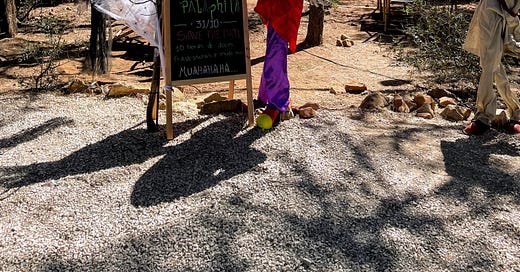About 4 weeks ago we were walking in an area of Cascais called the Guia. Atop a cliff, overlooking the ocean are restaurants, small boutiques and a park like area. There, we found evidence that halloween was celebrated in Portugal.
A Relatively New Thing
Since I wasn't sure if this was an official Portuguese holiday or a reflection of the large expat population of Cascais, I did some research. It appears Halloween in Portugal is a relatively new thing. After watching too much American television, Portuguese youth have determined that dressing up in costume is fun, and may result in getting candy. It appears this is more common in Portuguese cities, such as Lisbon and Porto, where you may also find Halloween-themed parties. To confirm the accuracy of my research, during a doctor’s appointment today (I must be getting old … I am seeing far too many doctors) I asked my 40ish physician if his children celebrated Dias das Bruxas (Halloween). “Yes,” he replied. “They like the sweets.”
Controversy
Of course, not everyone is happy about the Halloween invasion. Instead, they wish that the Portuguese would stick to more traditional holidays such as O Pão por Deus (Bread for God) when children go from door to door asking for bread to honor those who have passed away. Originating from the 1755 earthquake on November 1st, such “begging” was required to survive. Today in many towns and villages, children gather on 1 November and go from door to door reciting songs that ask for cookies, cakes, candy and coins.
Also, All Saints Day is 1 November and 2 November is All Souls Day, also known as the Day of the Dead. On these days, you will find many Portuguese families visiting the grave sites of family members that have passed away. If you track the history of Halloween you will find there is a direct connection between these holidays and Halloween.
In England and Ireland during All Saints' Day and All Souls' Day celebrations, poor people would visit the houses of wealthier families and receive pastries called soul cakes in exchange for a promise to pray for the souls of the homeowners’ dead relatives. Known as "souling," the practice was later taken up by children, who would go from door to door asking for gifts such as food, money and ale—an early form of trick-or-treating. — History.com
Fond Memories
I am old enough to remember when we were set loose to roam, in costume, large bags in hand on Halloween night. Our parents did not have to stand guard, take us to only the neighbors we knew, or to a mall for supervised Trick or Treating. I hope Halloween in Portugal is much the same as it was for me in the 60’s. Another reason to love Portugal.
Next Week: 200th post and my Facebook dilemma (sorry you may have also gotten this on Friday), Lisbon metro and what I learned at the Museu do Mar.






Ah yes, the 60s. (That decade from a prior century, not our current ages.) It could be because I was a smaller form of human at that time, but I do recall LARGE paper grocery bags filled with sugary treats--store-bought or homemade, and the counting/sorting process once we all (three other brothers) arrived home with our night's haul. Apples had to be caramel or candy apples to count as part of the sugar currency. If you lost a tooth while consuming the sticky goodness, it was because there was another tooth beneath, pushing the baby tooth out for the Tooth Fairy, not because your head was full of fillings, crowns, and bridges. Over these past six decades, I've watched the increased commercialization of what I remember as more wholesome celebrations. I'm sorry that some of these 'traditions' are seeping out into the rest of the world. The times, they are a changing.
Happy Halloween from across the pond. Thank you for reminding me of the historical perspective at this time of year. Enjoy your week.